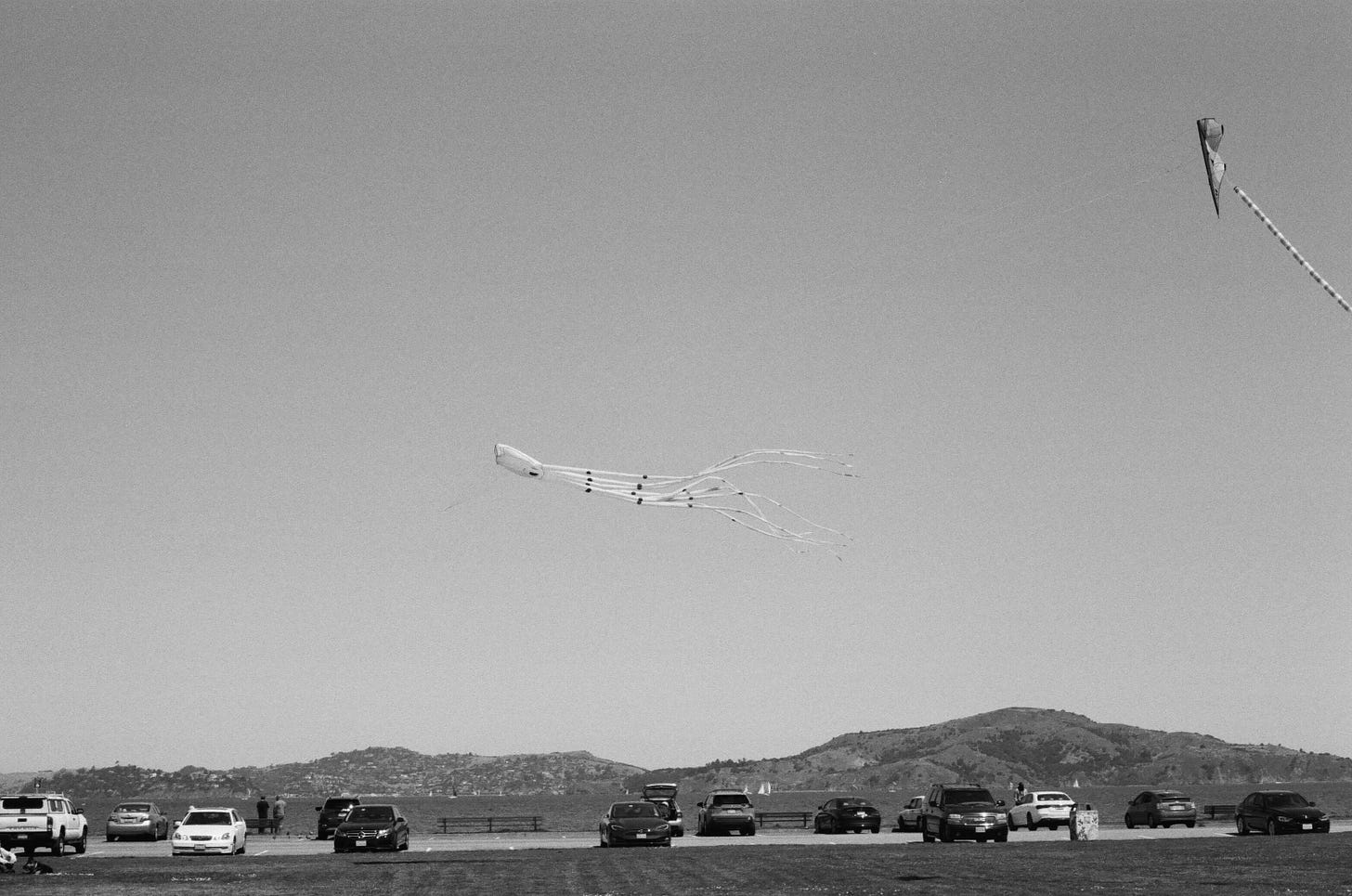2022 Round Up
What I've been reading and watching
Hi everyone,
Greetings from Washington, D.C.!
It’s been a while since I’ve written here, and I thought it might be fun to share what I’ve been reading and watching over the last 12 months and build some momentum for the next year of writing.
Programming note: I’ve had a happening year, but one thing I’ve terribly missed is writing. Momentum is a weird thing — it cuts both ways. The longer you have not written, the easier it is to continue to not write… But writing for me is a long-term affair, so I’m going to see if I can make up for this past year of not writing in 2023.
With that bit of self indulgent pity party-cum-resolution out of the way, let’s get into it:
Books
Lords of Easy Money by Christopher Leonard: The most important economic story of the last year was the successive increases in interest rates by the Federal Reserve. Chris weaves a story of well-intentioned1 actors who forced themselves into a corner with little maneuverability in their actions. All while not taking into account the full extent of the side effects of their decisions. But it is also a story of defiance — one guy who takes a stand and says “Not me.”
Lords of Easy Money is a piece of modern economic history, and probably the one book you should read in the New Year. It also happens to be a worthy successor to his previous book, Kochland (not an easy book to follow.)Rubicon by Tom Holland2: The idea that people can learn from history is not new. Aphorisms abound: “What’s past is prologue”, “Those who don’t learn from history are commended to repeat it.”, “Only a fool learns from his own mistakes, the wise man learns from the mistakes of others.” That should be motivation enough to read history. But I believe there is another level to this thought that’s under-appreciated. It’s that there are some events that are so canonical that everyone who has come after those events has factored them into their actions.
One such historical event (series of events, really) is the fall of the Roman Republic at the hands of Julius Caesar and the establishment of the Roman Empire by Augustus. The framers of every constitution have had these events in their minds while designing the checks and balances of power in their governmental structures. The story itself is colorful: there is a fascinating system, the cast of characters is intriguing, there are moral themes of decadence and decay, and a lot more. There are multiple generations of Romans at play, and each generation learns from the mistake of the previous one and adds successive nails into the coffin of the Republic. This is a period of history that people should know about because so much of later history is shaped by it. It ought to be more accessible.
Tom Holland’s Rubicon is the most accessible entry I have found into this universe. While it does have its critics in capital-H History departments, I’d rather read a 90% historically accurate account with a splash of pizzazz than a 100% accurate account that would be more useful as a sleeping aid.JFK by Fredrik Logevall: Ah of course, how can any of these lists written by yours truly be complete without a presidential biography? And JFK by Frederik Novegall easily takes the cake in this category for the year. It is the first volume in a 2-part biography of one of America’s most liked presidents ever. What it uniquely captures is how a young JFK who had the 1920s version of a Tiger Dad3 develops his own worldwide.
Most of my mental picture of Jack Kennedy comes from situations where he is not painted in the best light: the Years of Lyndon Johnson books by Robert Caro where he turns a blind eye to the legislative resource he has in his Vice President and his flagrant extramarital affairs. He’s born into enormous wealth in a world that has so little and has pretty much every advantage one can think of. So it’s fair to say that I did not come into this book with a positive view of Kennedy. It is important to recognize this because my mental picture was — if not transformed — definitely changed.
Is the young JFK enabled by privilege? Definitely. But he is not ruled by it. He thinks independently at a time of great change (Europe in the 1930s), often at direct odds with his father and his elder brother. It’s in these pages that you see the shaping of a strong foreign policy President, and a weak domestic one. I can’t wait to read part 2.Dark Sun by Richard Rhodes: The creation of the atomic bomb by the United States in 1945 is likely the most important event of the 20th century. The second most important event is the creation of the atomic bomb by the Soviet Union in 1949. Dark Sun tells the second, less popular story. It reads less like a physics textbook4 and more like a spy novel. And that’s no accident — espionage is a core part of the story here.
There are fascinating themes in the book. How do you/should you allocate resources towards a paradigm-shifting discovery in the middle of war that is by no means a sure shot? Are you justified in spying on your “allies” if they are not sharing something very, very important with you? How can scientists navigate the bureaucratic process5 when mistakes can be literally fatal? What does the psychological makeup of a country look like when it’s faced with something that it has no hope of competing against?
The story struck me with awe. To be a fly on the wall and feel what these people went through! If you’re interested in this timeframe/area of history, you can’t do better than Dark Sun.Becoming Trader Joe’s by Joe Columbe: When you look at a company like Trader Joe’s today, you subconsciously project into the past and assume that it always looked like what it looks like today — amazing frozen food and lovely little handwritten labels and all. But that’s obviously not true! There is obviously a story of how the company became what it is today. And no one can tell the story better than its founder, Joe Columbe.
I read this in the first few months of the year, and looking back, I remember it as a series of capturing small opportunities and arbitrages. People with wine collections don’t have a place to store them? Build a massive storage cellar and charge people to rent out a few spots. The Wisconsin Cheese lobby stops the import of particular cheeses from Europe that compete with theirs? Import unpopular cheeses and use distribution advantage to lower the cost barriers for customers to try them, making them popular in the process.
Note that this is not a coherent book. It’s more just a set of stories and Joe’s reflections on them. But that’s okay, because I think it is a more accurate representation of how it probably felt to be creating the company. If you’re into company histories or are a sucker for Trader Joe’s6, you can’t go wrong reading this book.Life, on the Line by Grant Achtaz: Here’s one way I would guess you can become better across disciplines: read about excellence, without reading something that is explicitly meant to be about excellence. This is a book about excellence without being explicitly about excellence.
It’s the life story of Grant Achatz, the chef behind the famed Alinea restaurant in Chicago. My favorite part of the book is about his time at The French Laundry in Napa, California where he apprenticed under Thomas Keller. You see a young chef with some talent and some ideas about what he wants to do being shaped by a master of his craft.
You can whet your appetite for this book by watching the Netflix show Chef’s Table episode on him — it’s Season 2, Episode 1.
Movies
This year, I enjoyed movies that offered a sense of novelty. This means movies that are not quite esoteric (I doubt I’ll ever be that person), but do offer something that stays at the back of your head for a few days or weeks after you finish the movie.
Here are some movies that hit that Goldilocks zone for me this year:
Banshees of Inshirin by Martin McDonagh (2022): People often say, “You’re the average of the five people you spend the most time with.” It’s tough to argue with this, but I do take offense to its corollary, “You have to cut people who don’t add value to your life.” As if Barack Obama is going around firing his childhood friends!
Banshees of Inshirin is an ode to friendship and an antidote to the “upgrade your friends” pseudo-motivational crap that goes around on social media. It touches on themes of loneliness, economic opportunities, and small town living.
I highly recommend a watch.Tokyo Story by Yasujiro Ozu (1953): Here’s a question that I’d love an answer to — why is the Japanese film industry so good at making movies about families? I am sure that there is an answer to my question gathering dust in a PhD dissertation on some library shelf.
But in the meantime to experience what I mean, you have to watch Tokyo Story. The set up is deceptively simple. An elderly couple visits their children and widowed daughter-in-law in post-World War 2 Tokyo. What follows is an honest portrait of family dynamics and how “blood” relations are only a part of the family that we leave the world with.
No wonder that it’s consistently rated one of the best movies ever.
Everything Everywhere all at Once by Daniel Kwan and Daniel Scheinert (2022): What Everything Everywhere All at Once achieves is co-opting a piece of a commercial conglomerate, the introduction of the multiverse in Doctor Strange: The Multiverse of Madness, and turns it into something a bit more absurd and a lot more touching.
It’s self-contained. There is no need to wait for the post-credit scenes — there are none. This isn't that kind of movie. And it achieves this without compromising on the technical achievement.
This "indie" production matches Marvel punch for punch in the out-of-this-world spectacle. It’s good to see a much smaller production budget that can still hit those high technical notes without giving into the uber commercialization of the Marvel movies.The Godfather: Part I (50th Anniversary edition) by Francis Ford Coppola (1972): Another one of the greatest of all-time and what a treat to watch this in the theater! I don’t really have too much to say here, expect for the fact that if you get a chance to experience this movie in a theater, do yourself a favor and get that ticket.
Decision to Leave by Park Chan-wook (2022): This South Korean movie makes the list because I found it to be technically very impressive, but never found myself engrossed in the story. From my conversations with my friends who are into movies, it seems like I am in the minority here so your mileage may vary.
Flee by Jonas Poher Rasmussen (2022): If you decide to watch this movie, be ready to shed a few tears. A heart wrenching tale of what being a refugee is actually like. A reminder of how grateful you should be if you have a place you can call home that is safe.
Tár by Todd Field (2022): There is something so tempting about a movie driven by a single character to an extreme. Think Uncut Gems and Adam Sandler’s character, Howard Ratner. Nothing in that movie works without Sandler’s virtuoso-like performance.
That’s the top note of Tár and Cate Banclett. The movie explores themes of achievement, the dark side of it, and the reality distortion side of genius. Some say that this is a “cancel culture” film, I’m not sure I totally agree.
If Banclett doesn’t clean up at the Oscars after this, now that would be a slap in the face to the legitimacy of the Academy.Turn Every Page by Lizzie Gottlieb (2022): I had the chance to go to the Virginia Film Festival in Charlottesville to watch this documentary about the relationship between writer Robert Caro and editor Robert Gottlieb. It’s such a joy to see two experts of their craft trade (metaphoric) blows about what should and should not be included in Caro’s literary masterpieces.
It seems to me that Caro has been on a mission of expanding accessibility to his books. First, with his autobiographical Working and now this documentary. Not that I’m complaining — I hope the Caro gospel gains more acolytes.
And yes, of course Top Gun: Maverick was great. It’s the perfect nod to the now-nostalgic 80s/90s7. Someone has to write a pseudo-philosophical Substack essay on how Tom Cruise and the US are archetypes for each other. If one hasn’t already been written…
Photography
I really enjoyed learning analog photography this year. There are so many components of taking a photo that are hidden from you on a phone. I feel like I’ve re-learned something I already knew.
I’ll leave you with some of my favorite shots from the last year:
Happy New Year and hope to see you (and your inboxes) more often in 2023.
Sincerely,
Sid
There is perhaps nothing more dangerous than a set of well-intentioned and ideologically motivated set of people who happen to be wrong.
Not the Spiderman actor!
Safe to say that you would expect some Tiger Dad qualities from someone who was the first Chairman of the SEC (Securities and Exchange Commission) and the US Ambassador to the United Kingdom, among other titles.
Rhodes’ Pulitzer-winning, The Making of the Atomic Bomb, about the creation of the atomic bomb in the US does read like a textbook. For me, Dark Sun has the better story.
The theoretical best answer here would be something like, “They shouldn’t have to navigate any bureaucracy.” But sometimes you have to play the ball where it is, not where you want it to be. And when the person at the top of the bureaucracy is one Joseph Stalin, you’re definitely going to have to play the ball where it is.
I’m guessing there are more people in the sucker-for-Trader-Joe’s camp than the I-love-me-some-company-history camp. Good for the writer of this newsletter that he is in both.
I wonder if anyone will be nostalgic about the 2020s. I’m sure that people in the 80s didn’t think that some people would be nostalgic about a recession, Iran-Contra, and Ronald Reagan! People tend to forget parts of the decade that seemed salient in the moment and project their own sense of “vibe” on the past. In that sense, the past is not a static set of facts — it is endlessly malleable for people’s own ends.







